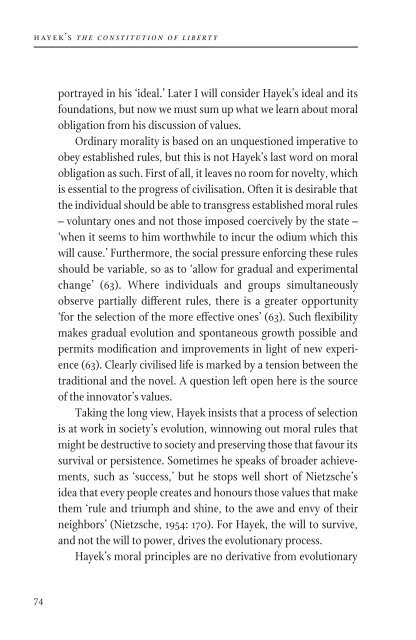Hayek's The Constitution of Liberty - Institute of Economic Affairs
Hayek's The Constitution of Liberty - Institute of Economic Affairs
Hayek's The Constitution of Liberty - Institute of Economic Affairs
Create successful ePaper yourself
Turn your PDF publications into a flip-book with our unique Google optimized e-Paper software.
h ay e k ’ s t h e c o n s t i t u t i o n o f l i b e r t y<br />
t h e u s e a n d l i m i t s o f k n o w l e d g e<br />
portrayed in his ‘ideal.’ Later I will consider Hayek’s ideal and its<br />
foundations, but now we must sum up what we learn about moral<br />
obligation from his discussion <strong>of</strong> values.<br />
Ordinary morality is based on an unquestioned imperative to<br />
obey established rules, but this is not Hayek’s last word on moral<br />
obligation as such. First <strong>of</strong> all, it leaves no room for novelty, which<br />
is essential to the progress <strong>of</strong> civilisation. Often it is desirable that<br />
the individual should be able to transgress established moral rules<br />
– voluntary ones and not those imposed coercively by the state –<br />
‘when it seems to him worthwhile to incur the odium which this<br />
will cause.’ Furthermore, the social pressure enforcing these rules<br />
should be variable, so as to ‘allow for gradual and experimental<br />
change’ (63). Where individuals and groups simultaneously<br />
observe partially different rules, there is a greater opportunity<br />
‘for the selection <strong>of</strong> the more effective ones’ (63). Such flexibility<br />
makes gradual evolution and spontaneous growth possible and<br />
permits modification and improvements in light <strong>of</strong> new experience<br />
(63). Clearly civilised life is marked by a tension between the<br />
traditional and the novel. A question left open here is the source<br />
<strong>of</strong> the innovator’s values.<br />
Taking the long view, Hayek insists that a process <strong>of</strong> selection<br />
is at work in society’s evolution, winnowing out moral rules that<br />
might be destructive to society and preserving those that favour its<br />
survival or persistence. Sometimes he speaks <strong>of</strong> broader achievements,<br />
such as ‘success,’ but he stops well short <strong>of</strong> Nietzsche’s<br />
idea that every people creates and honours those values that make<br />
them ‘rule and triumph and shine, to the awe and envy <strong>of</strong> their<br />
neighbors’ (Nietzsche, 1954: 170). For Hayek, the will to survive,<br />
and not the will to power, drives the evolutionary process.<br />
Hayek’s moral principles are no derivative from evolutionary<br />
theory. Individuals cannot possibly be under an imperative to<br />
follow moral rules that will, in the long run, ensure society’s<br />
survival or success, since the future is unpredictable. Only rarely<br />
can we know what the eventual results <strong>of</strong> our actions will be. Even<br />
when a group or nation follows the teachings <strong>of</strong> what it regards as<br />
its best men, it may ‘destroy itself by the moral beliefs to which it<br />
adheres.’ When it comes to the values that preserve society, these<br />
are selected by an impersonal evolutionary process and not by<br />
far-sighted individuals. Imagining that we can foresee or plan the<br />
future is a rationalistic illusion. <strong>The</strong> best we can do is to maintain<br />
a free society, where individuals can choose among competing<br />
ideals, and to cultivate diverse human capacities. In such a society,<br />
destructive tendencies are ‘self-corrective,’ since ‘groups guided<br />
by “impractical” ideals would decline, and others, less moral by<br />
current standards, would take their place’ (67).<br />
I close on a cautionary note. Hayek provides two separate and<br />
somewhat different accounts <strong>of</strong> value in <strong>The</strong> <strong>Constitution</strong> <strong>of</strong> <strong>Liberty</strong>.<br />
<strong>The</strong> first account – the one that we have just now explored – is<br />
developed chiefly in Chapter 4, in connection with the discussion<br />
<strong>of</strong> tradition, moral rules and opinion. Here Hayek emphasises that<br />
moral rules typically demand unconditional obedience from the<br />
individual and that social pressure to conform to moral rules is<br />
both potent and beneficial. <strong>The</strong> second discussion <strong>of</strong> value comes<br />
in Chapter 6, in connection with a discussion <strong>of</strong> justice and its<br />
relation to economics. Here Hayek insists that society values the<br />
‘results’ <strong>of</strong> the individual’s actions more than his moral merit,<br />
implying some relaxation in conformist pressures. <strong>The</strong> two discussions<br />
differ in tone, if not in substance, although both strongly<br />
defend freedom <strong>of</strong> action. Whether their discussions <strong>of</strong> values and<br />
moral rules can be reconciled remains to be seen.<br />
74<br />
75












